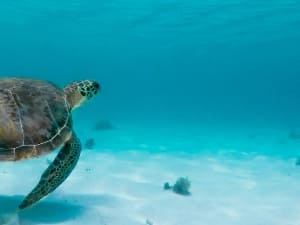
The more you look and wonder about your turtle the more you’ll learn about the animal, you may notice that your pet’s shell has an interesting color, or that your pet prefers certain toys, or you may notice that your turtle seems smaller than the others
This article is a look into why your turtle is so small.
Table of Contents
Why is my turtle so small?
Turtles come in various sizes, but if you’re worried that your pet is too small for your liking then you may start to worry
Here are the reasons why your turtle may be so small:
Musk turtle:
If your turtle starts off small, and seems to stay small for the whole of its life then you may be raising a musk turtle. These turtles are naturally small only reaching six inches in size
Other turtles that stay small include the Tabassco mud turtle and the spotted turtle.
The male spotted turtle in particular stays fairly small. In fact, many male turtles stay small.
What to do:
If you’re raising a turtle, and you notice that the animal is quite small then you may simply be raising a small turtle species.
Try to identify what type of turtle you are raising and compare its size to other turtles of the same species and age.
If the size of your turtle is similar to the normal size of these turtle then your pet is fine and you have nothing to worry about.
Lack of food:
Det is a big factor when it comes to turtle growth, your turtle’s growth may be stunted because it eating enough
If you’re giving your pet a balanced diet, but one or some turtles seem to be growing normally and others don’t seem to be growing at all, then the bigger turtles may be bullying the other turtles away from food sources.
Turtles are just like any other animals, they will compete for food even if that means bullying small animals and not allowing them to eat.
What to do:
The smaller ones can’t compete against the larger turtles so separating them is recommended.
You can start off with a trial separation and see if the smaller turtle eats when it is isolated from the others.
Make sure that the single turtle and the group both get a balanced diet with enough calcium. The animal’s diet should consist of pellets, worms, meat, fish, vegetables, green leaves, and aquatic plants
If need be, supplements can be given to your turtle if they need them. Calcium and protein are what are needed for healthy growth.
Illness/parasites:
Another reason why your turtle may be small, and not growing, may be because the animal is suffering from an infection from a parasite.
Parasites that can affect your turtle include flukes, tapeworms, or roundworms. Any of these parasites can cause the reptile to develop diarrhea which, over time, can lead to weight loss or malnutrition.
A malnourished turtle will stop growing and simply stay small
What to do:
Fecal exams are needed to treat parasites in turtles, this can be done by you or a vet. The exam involves examining the turtle’s poop for worms.
Diagnosing tapeworms is more difficult because their eggs aren’t usually shed as frequently in the animal’s feces.
In this case, you’d need a sample of the animal’s feces. Place it in a small jar of isopropyl alcohol (rubbing alcohol), and have a herp vet examine it.
Your vet will give you a dewormer to administer to your pet if needed. Parasites in turtles are usually successfully treated with praziquantel.
You shouldn’t treat your pet yourself as some dewormers are potentially dangerous and can cause fatalities if not used correctly

